Thanks for your support! If you make a purchase using our links in this article, we may make a commission. And, as an Amazon Associate, I earn from qualifying purchases. See the full disclosure here.
How do you keep your RV fridge cold while traveling? This is a great question, particularly if you are moving from place to place a lot. Depending on what type of RV refrigerator you have, it can take up to 24 hours to completely cool down your RV fridge and it is recommended you keep your fridge empty during the cool down to maximize air flow. This could become an issue, particularly if you have an absorption-style unit. It takes more time to exchange the heat out of this type of refrigerator than a typical fridge.
So what is an RVer to do? In a nutshell, there are basically two ways to keep your fridge cool while traveling. You can follow the tips below and keep the refrigerator off during your travel. Or, you can run your propane or use a battery to keep the refrigerator on while driving. Keep reading to see the positives and negatives for both options.
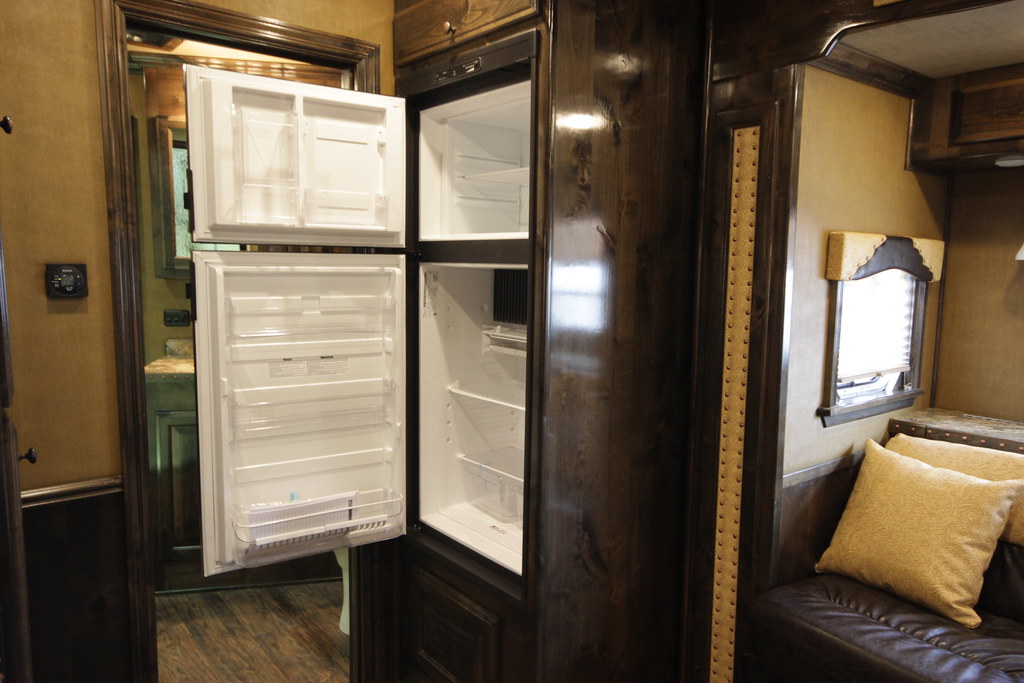
10 Tips to Keep Your RV Fridge Cold When Driving
1. Lower the Fridge Temp Before Leaving
Set your refrigerator at the lowest setting possible, without freezing items. In other words, get it to the lowest possible temperature before you turn it off. The colder it is, the more time you should have before it warms up. You can do this the night before leaving or several hours before. RV refrigerators are designed to be thermally efficient and will stay cold enough to keep food for 10-12 hours.
2. Refrigerate Items at Home Before Loading Them into Your Fridge
Placing warm drinks or food into your fridge will cause the unit’s temperature to rise. Make sure drinks are chilled before packing the refrigerator. Frozen drinks such as water or juice will help to keep the temperature down as well.
3. Consider what you pack in your fridge
Not everything you have in your RV refrigerator needs to be there. You can store condiments in a side cooler as well as drinks and snacks that you want to be able to reach. These items are not likely to spoil if they get a little warm.
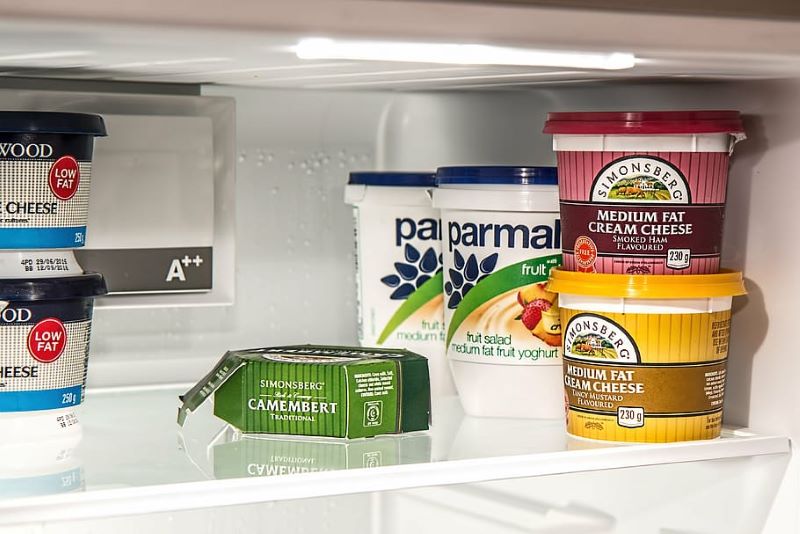
4. Place Ice Packs in Your Fridge
What and how you pack your refrigerator will make a lot of difference in how cold it will be when you arrive at your destination. Be sure to pack tightly so things don’t move around. Place ice packs between items. Avoid using frozen food or ice cubes in place of ice packs. Frozen food can spoil or drip juices (particularly meats) and ice cubes will create water in the refrigerator. Items such as bottled water or juice are great to help keep your fridge cool.
Mike and Susan from RVBlogger use ice packs to cool their fridge the night before they leave on a trip. Then they keep the ice packs in the freezer while camping and hooked up to shore power. Once they begin traveling again they place the ice packs back into the fridge while on the road.
5. Avoid Opening the Fridge While Traveling
Every time you open the refrigerator you lose cold air. Pack anything you want for drinks and snacks in a cooler that you can access. You can also use the generator during breaks which will help keep the temperature down.
Keep in mind, if you have a travel trailer or fifth wheel with slides, you may not be able to access the refrigerator. Most will only lose about 4 degrees Fahrenheit every eight hours, if you leave the door closed.
6. Use a Fridge Fan Inside Your RV Fridge
Using a fan inside your RV fridge can also help to keep food cool by circulating air. A small, battery-powered fan can go right in your refrigerator while you drive.
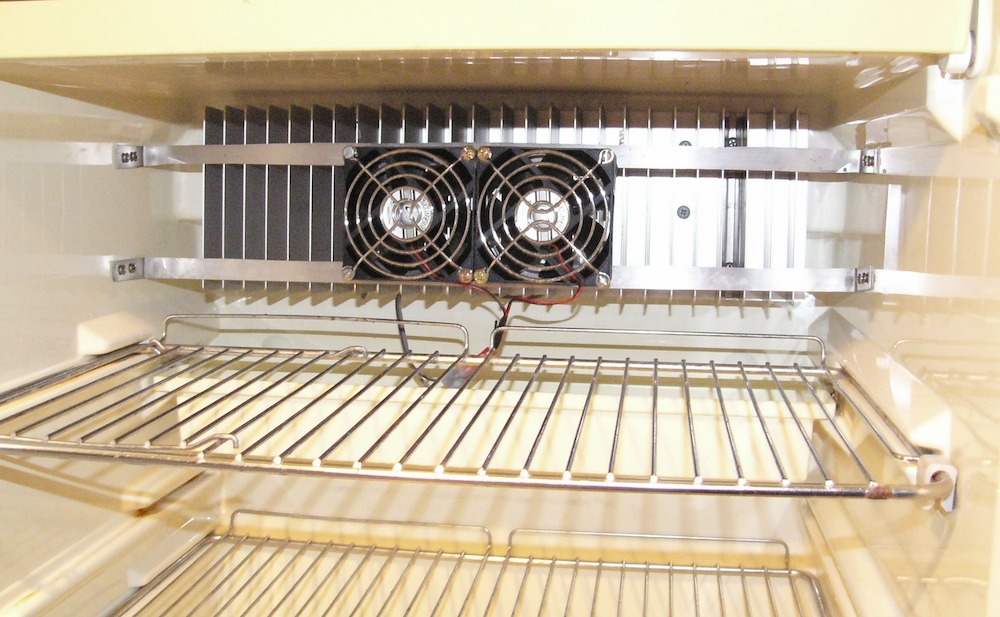
7. Monitor with a Thermometer Inside Your Fridge
You can monitor your refrigerator temperature with a refrigerator thermometer. You can also purchase temperature monitors with wireless sensors so you don’t have to open the door to check. Food should be kept at 40 degrees or below. Food will quickly begin to spoil at 50 degrees and higher.
8. Run the Generator While Traveling
Some larger RVs come with built-in generators which may be used while traveling. Most generators have gasses such as carbon monoxide that are vented outside of the unit and can’t be used in an enclosed space. They also can heat up without adequate air circulation. Some are also loud enough to require hearing protection and you should consider others if you are parked at a rest stop or other public places and turn on the generator.
9. Run propane while you drive
There are different opinions about whether you should run propane while in transit. This is another option to keep your food cool. See below for more details about whether you should or should not run propane.
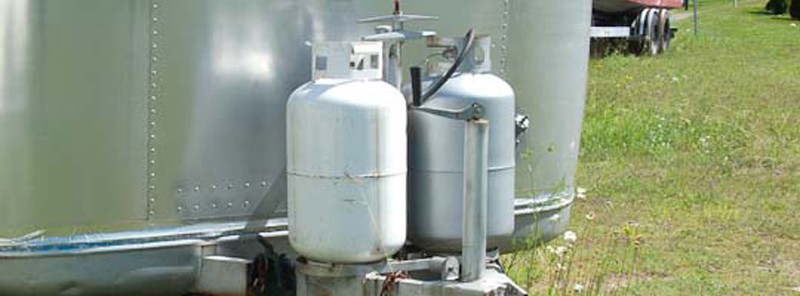
10. Purchase perishable food when you get to your destination
As I said earlier, it can take up to 24 hours for a warm refrigerator to cool down. Purchasing perishable goods when you arrive is a solution. But depending on how often you are moving, this may not be a practical one.
Basic Info About How RV Fridges Work to Stay Cold
Electricity
Electricity is 120V power from shore power.
Propane
Also known as “two-way” refrigerators, these run on propane along with a 12-volt battery to ignite the propane.
Battery
Refrigerators that run on battery power in addition to the two ways above are called 3-way fridges. This fridge can run off your house battery. Most refrigerators, however, work best when fueled by propane or electricity.
Can I Use Propane to Power My RV Fridge While Driving?
You can use propane while driving but there are a few things to consider before you head out. Propane is the most efficient way to keep your RV refrigerator running to ensure your food stays cold. You will need to be aware of the quality of your lines and tank.
A leak or crack or an improperly secured propane tank can ignite and cause a fire or explosion. Make sure you have those lines inspected on a regular basis. If you smell propane, turn off the system until the leak is found and it is properly repaired.
Are There “green” Ways to Power an RV Refrigerator?
One “green” alternative is to use portable solar panels, even while driving. If you have a fridge that runs on battery power, this method is definitely friendly to the environment.
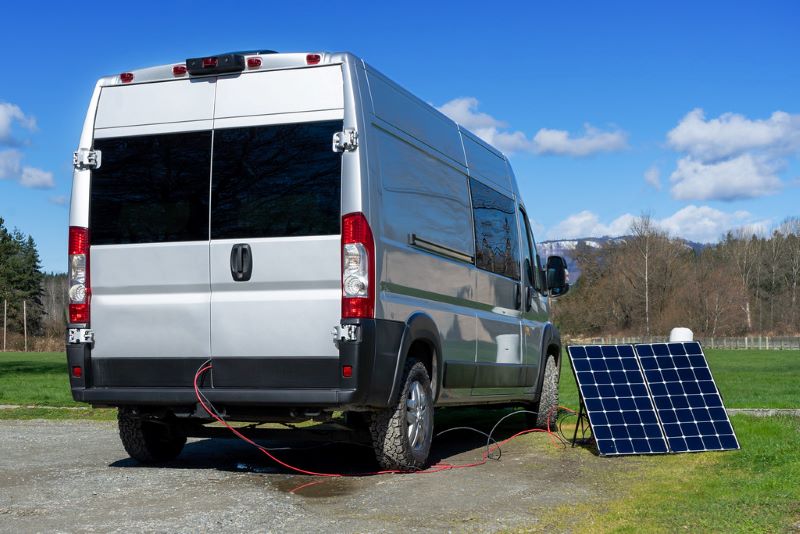
FAQ’s About How to Keep Your RV Fridge Cold While Driving
1. Is it OK to Leave the Propane on While Driving?
There is a long-running debate on whether it is safe to keep your propane on while driving. Propane is flammable and a leak could cause a fire or explosion. If your propane lines and refrigerator are installed correctly there is no law against driving with your propane refrigerator running. Most states require you to turn off all gas appliances and sources of flame when you are refueling.
2. Is it OK to Run the Generator While Driving?
It might be ok to run the generator but it likely isn’t going to be practical. With noise, fumes, and lack of ventilation, you probably want to try another option.
3. Is a 3 Way Fridge the Best Way to Refrigerate My Food?
A three-way refrigerator gives you several options to keep your appliance running and your food cold. Keep in mind, however, you want to make sure you have plenty of battery power when you arrive at your destination if you choose to use that to keep your food cold.
4. Can I Keep My RV Fridge Cold When it is Turned Off?
There are a number of ways that will successfully keep your RV refrigerator cold while it is turned off. Follow a few simple rules and you won’t lose any food to spoilage. Remember, however, that it does take approximately 24 hours for the unit to cool down after it is turned off.
Conclusion
No one wants to ruin a vacation by having to deal with spoiled food. Keeping your refrigerator cold is vital to the health and safety of you and your family. If you full-time RV, this is particularly important.
Because we stay in one place for 5-6 months at a time, we can plan for travel days. We usually pare down our refrigerator and freezer so there is little in them to spoil before we head out, also making sure to defrost before we go.
Also, if you are leaving your rig for a day or two to site see elsewhere, take into consideration that you may have a break in electrical service during that time. That happened to us once when we went home to visit family. We came back to a refrigerator full of spoiled food.
Take into consideration some of the ideas listed in the article and do what makes you most comfortable and what works for your lifestyle.
A little bit of planning can make a difference so you can arrive at your destination ready to enjoy your next adventure.
Related Reading:
Can RV Refrigerator Fans Make Your Fridge Cooler?
How Long Will an RV Fridge Run on Propane?
What is a 3 Way RV Fridge and Should You Buy One?
Can You Put a Residential Fridge in an RV?
What Temperature Should My RV Fridge/Freezer Be?
About the author:
Terri Nighswonger – Author and Full Time RVer
Terri Nighswonger and her husband Todd have been RVing and work camping for six years with their Cavalier King Charles Spaniel, Newton, and their Minnie Australian Shepherd, Remi.
In Addition to the RVBlogger team, Terri has written for RV Life and RV Camping Magazine and is always excited to talk about her passion for RVing and her knowledge and experience in work camping.
Writing is Terri’s passion, but she also loves hiking, kayaking, walking her dogs, and anything she can do outdoors.
They originate from the Midwest but plan to enjoy the West for a few years, wintering in Arizona and summering wherever the road may lead.


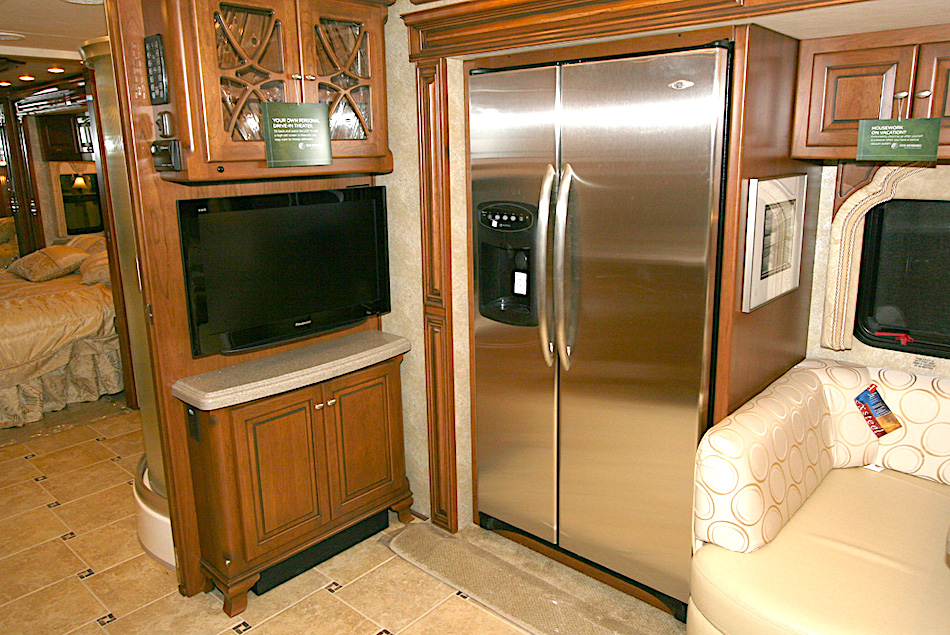
I fill 1/2 gallon plastic milk jugs have full of water and freeze at home before a trip. I put 2 in the frig and 1 in the freezer plus turn the frig on 3 days before the trip. the frozen water will be cold drinking water when it melts. Put the ice in when you pack the frig.
I use the blue ice pacs when on the road. Work great. I have a small fan to circulate air. Runs on 2 D cells.
Rarely drive over 200-250 miles in a day.